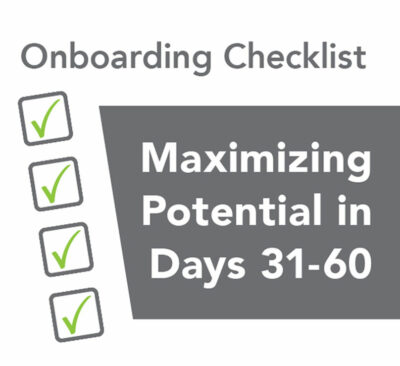 Effective onboarding should provide essential information and foster a sense of purpose and belonging for new hires from day one. To help with this process, we created a comprehensive Onboarding Checklist you can download and use in your organization’s unique onboarding processes. Last month, I covered the 5 focus areas for the first 30 days from our checklist and their accompanying tasks in more detail.
Effective onboarding should provide essential information and foster a sense of purpose and belonging for new hires from day one. To help with this process, we created a comprehensive Onboarding Checklist you can download and use in your organization’s unique onboarding processes. Last month, I covered the 5 focus areas for the first 30 days from our checklist and their accompanying tasks in more detail.
In this article, we’ll look at maximizing your new team member’s potential in days 31-60. This time should be a pivotal period of role-specific training, delving deeper into honing the skills required to be successful within your organization and fostering lasting connections for your new hire. Here are 3 ways to enhance specialized training as employees settle into their new roles, and 3 ways to further integrate your new hires and provide feedback for the future during days 31-60 of the onboarding process.
Specialized Training
1. Comprehensive Training Review
Continuous learning is the cornerstone of effective employee development. Encouraging a review of training materials will empower your employees to grasp the intricacies of their new roles and understand the broader organizational landscape as they settle in. To enhance this process, try providing access to supplementary resources that will ensure a well-rounded knowledge base and promote ongoing education. This can range from anything like relevant books to industry or professional development, to microlearning from previous training, webinars, workshops, or podcasts that support their learning and development.
2. Job-Specific Tasks and Responsibilities
To help reinforce your new hire’s understanding of their integral role within the company, it’s important to tailor their tasks to their individual role to help them form a sense of specialization and expertise while they learn. These tasks should emphasize their individual contributions but align with the organization’s goals.
3. Independent Work Assessment
Evaluating the employee’s ability to work autonomously becomes a critical step in this phase of onboarding. Beyond the basics, a comprehensive assessment involves scrutinizing problem-solving skills, identifying areas of strength, and pinpointing specific aspects that may require further development or additional support. This detailed analysis serves as a roadmap for personalized professional growth. This can be done through self-paced learning modules with quizzes to test knowledge, interactive simulation, or gamification, or even a meeting with a higher-up to review their progress so far.
Integration and Feedback
1. Ramp Up Workload
To facilitate a seamless transition into regular work routines, gradually increase your new hire’s responsibilities. During days 31-60, focus on workload management. While this time is critical to master their tasks, there needs to be time to acclimate to the company culture and understand their roles fully without being overwhelmed. Employees need support during this period of heightened responsibility to promote long-term engagement and job satisfaction.
2. Goal Progress Evaluation
To add a layer of strategic foresight to the onboarding process, new hires should be able to identify achievements during their first 30 days and areas for improvement during their next 30 days. The nature of this evaluation allows for the adaptation of goals based on evolving role expectations during the onboarding process. Asking new hires to explore their goals offers them the chance to reinforce skills and be continuously learning. This can be done with regular check-ins or by utilizing performance metrics and key performance indicators.
3. Celebrating Small Wins
As always, celebrate the small stuff! Acknowledging their achievements—even if it’s something as simple as completing their official training, this helps to reinforce a positive work environment which should be cultivated during the initial onboarding phase. By beginning with a culture of appreciation, you can continue to motivate and empower employees throughout their journey.
Well into the onboarding process, days 31-60 are where employee development takes center stage and a well-executed onboarding strategy during this time can not only heavily refine employee’s skills but significantly impact their future trajectory within the organization. Beginning with specialized training and further integrating new hires by way of increased responsibility and an evaluation of their progress helps to create the groundwork for a mutually beneficial and enduring professional relationship.
Don’t forget to download our Onboarding Checklist to use in your organization’s onboarding process for a quick reference tool!
